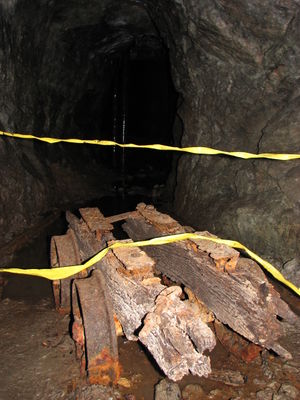Students:Monday, Day Three
Another day of adapting to a fluid situation with the programme. The day began with a quick tour of Hora Svaté Kateřiny down to the square and then a walk to the border crossing and the Mikulaš adit where we were met by former deputy mayor and well-known local ecological activist Petr Pakosta who distributed helmets for a guided tour through the former silver mine shaft, including a stop-off at the local troll's brandy stash hidden in the former armaments storage area. Pan Pakosta explained the history of silver and tin mining in the area, the technology used in the Middle Ages, efforts to revive silver mining in the early 20th century after most the mines were exhausted in the 17th century, the use of the old adits for storing munitions during the war, and possibility that the Nazis may have used the mines for hiding valuable works of art from Dresden at the very end of the war.
Everyone walked back up the hill to meet up with the town's deputy mayor, Lukáš Pakosta, who showed students the vintage laundry press dating from the Middle Ages and which is still in use, and then chatted to the students in the cinema about the current town situation, including the possible impact on the town of breaching the current ecological mining limits.
Back to the hotel for lunch, followed by arrival soon after of the deputy mayor of Horní Jiřetín, Vladimir Buřt, who spoke about his town's battle with the mining companies and the efforts to breach the mining limits. Mirek Havranek and Jan Melichar then arrived from Prague to deliver presentations on the state energy plan and the externalities of breaching the mining limits. The day ended with a student assignment to map stakeholder relationships from the perspective of individual stakeholder groups.
More images: Day Three Photos
